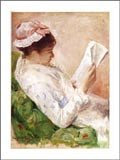Never Let Me Go - Kazuo Ishiguro
What I remember most about Ishiguro's earlier book, Remains of the Day, is that he was able to capture the nuances of language and gesture that can separate people, or define them. In this book, language and nuance are key because the characters possess almost nothing else.
When we meet Kathy, Ruth, and Tommy, they are students in a posh English boarding school. It becomes apparent quickly that the education they are receiving is not typical, and that they are being educated for an unusual purpose. They become aware that their destinies will not be chosen freely. That awareness almost becomes a character in itself, growing and becoming, simultaneously, more nuanced and more overt. The women who instruct them might be religious Sisters but for the lack of religion or spirituality in the curriculum.
These children are permitted one box of treasures apiece. The things that comprise "treasure" may have come from the trucks that bring random objects to the school - a cassette tape of an obscure singer, say, or a fancy pencil case. The treasured objects that define and separate the children are pathetic artifacts from a world they have yet to experience.
I hesitate to further define the plot. The details of these childrens' destiny are revealed fairly early in the book. How they deal with this certainty, and how their relationships change as they go through their lives, comprise most of the novel. Again, details and nuance rule until the end of their lives.
If I had to sum up the book in one phrase, it would be "mysterious dystopia." One never learns why these children were essential to the plan that their lives took, but that question (for me, at least) did not surface until I closed the book and begun to ponder. I'm still pondering, and making connections to books and films that have addressed the central issue. Ishiguro's genius in showing us the hidden corner of a dystopia is strongest in what he does not reveal. The negative space of that world is limned, delicately.
"Tell the truth but tell it slant," says Emily Dickinson. Absolutely.
8.28.2008
Subscribe to:
Post Comments (Atom)


No comments:
Post a Comment